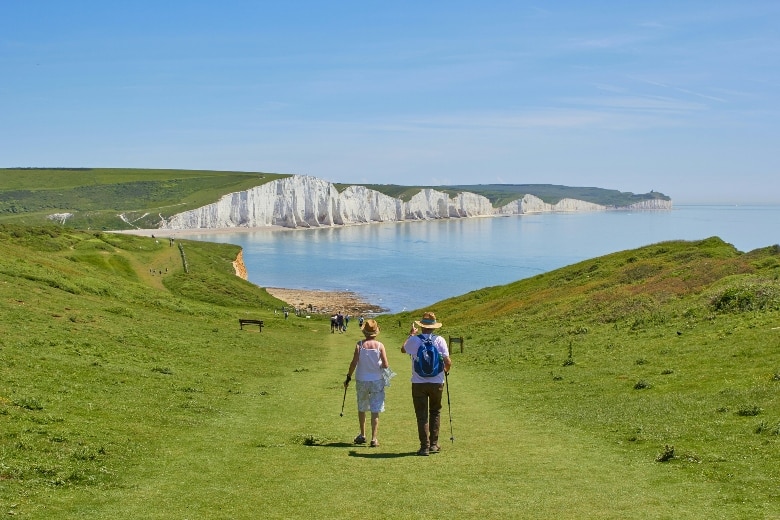
Retirement opens up a world of possibilities, offering the freedom to explore new interests and enjoy life. However, after decades of work, finding fulfilment can be challenging. Fortunately, fulfilment doesn’t have to come with a hefty price tag. Here are 20 low or no-cost sources of happiness and fulfilment for retirees in the UK, including some unconventional ideas to inspire you.
1. Embracing Nature
One of the simplest pleasures available is spending time in nature. The UK is blessed with an abundance of parks, nature reserves, and scenic countryside. Walking in your local park, hiking through the countryside, or even gardening can provide immense joy and satisfaction. Not only is it good for your physical health, but it also boosts mental well-being.
Click here for National Trust sites, RHS gardens and Forestry Commission Trails to get started.
2. Engaging in Community Activities
Participating in community activities is a great way to stay socially active and connected. Many communities offer free or low-cost events that can enrich your life and introduce you to new friends.
For example there is:
- U3A (University of the Third Age): This organisation provides learning opportunities for retirees at a minimal cost. You can join groups focused on everything from art to zoology. Find out more here.
- Local Libraries: Libraries often host free events, including book clubs, lectures, and craft sessions. They are also a great place to borrow books and DVDs.
3. Volunteering
Giving your time to help others can be incredibly rewarding. Volunteering not only provides a sense of purpose but also allows you to meet new people and develop new skills.
Opportunities to Volunteer include:
- Charity Shops: Many charities rely on volunteers to help run their shops. It’s a wonderful way to give back while staying busy.
- Community Projects: Look out for local community projects that need volunteers. Whether it’s helping at a food bank or participating in environmental clean-ups, there are numerous ways to get involved.
- Environmental projects: Local green spaces often rely on volunteers to help maintain them.
4. Learning New Skills
Retirement is an excellent time to learn new skills or pick up old hobbies. Many online platforms offer free or inexpensive courses that can keep your mind active and engaged.
Online learning resources include:
- OpenLearn: This free learning platform from The Open University offers a wide range of courses on various subjects. Find out more here.
- Coursera: While some courses require payment, many are free to audit, allowing you to learn from top universities and institutions around the world. Find out more here.
5. Enjoying the Arts
You don’t have to spend a lot of money to enjoy cultural activities. There are plenty of affordable ways to experience the arts, from free museum entries to discounted theatre tickets.
Affordable arts and culture include:
- Museums and Galleries: Many museums and galleries in the UK, including the British Museum and the National Gallery, offer free entry.
- Community Theatre: Local theatres often have reduced-price tickets for seniors, and community theatre productions can be a delightful experience.
6. Socialising
Maintaining social connections is vital for mental health and overall well-being. Regular social interaction can come at little to no cost and is crucial for a happy retirement.
Social activities include:
- Coffee Mornings: Hosting or attending coffee mornings can be a delightful way to catch up with friends. The MacMillan coffee mornings are an ideal way to show off your baking skills, socialise and support a good cause. Find out more here.
- Neighbourhood Groups: Joining or forming neighbourhood groups can provide regular social interaction and support while undertaking activities such as sewing and walking.
7. Mindfulness and Relaxation
Practising mindfulness and relaxation techniques can greatly enhance your sense of contentment. These practices are free and can be done anywhere.
Mindfulness practices include:
- Meditation: Apps like Calm and Headspace offer free guided meditations. You can also find numerous free resources online.
- Yoga: Many local community centres offer low-cost yoga classes, and there are plenty of free videos available online.
8. Exploring Your Hobbies
Hobbies are a fantastic way to pass the time and find joy in retirement. Whether it’s painting, knitting, or bird watching, hobbies can be both fulfilling and inexpensive.
Low-cost hobbies include:
- Gardening: A small garden or even indoor plants can bring a lot of joy.
- Reading: Joining a library gives you access to a vast array of books without the need to purchase them.
- Walking: See embracing nature above.
- Art classes: you may have an artist lurking within you wanting to express themself.
9. Taking Advantage of Senior Discounts
Many businesses offer discounts to senior citizens, which can help you enjoy activities and services at a reduced cost.
Senior Discounts are available for:
- Travel: Railcards for seniors can significantly reduce travel costs.
- Leisure Centres: Many leisure centres offer discounted rates for seniors, providing access to swimming pools, gyms, and classes.
- Search through a wide range of discount options here.
10. Staying Active
Regular physical activity is crucial for maintaining health and well-being in retirement. Many forms of exercise are free or low-cost.
Affordable exercise options
- Walking: It’s free and can be done almost anywhere.
- Cycling: If you have a bike, cycling is an excellent way to stay fit and explore your local area. The rise of electric bikes has made this accessible for more people who may otherwise have not felt fit enough.
11. Exploring Local Heritage
The UK is rich in history and culture, with numerous heritage sites that are either free or very affordable to visit. Exploring local heritage can provide a fascinating insight into the past and offer great opportunities for leisurely days out.
Heritage sites and activities
- Historic Walks: Many towns and cities offer self-guided walking tours of historic areas, often with information available online or at local tourist offices.
- Open House Events: Look out for Open House weekends, where historic buildings and private homes open their doors to the public for free. The National Trust and English Heritage are good starting points.
12. Cooking and Baking
Retirement can be the perfect time to hone your culinary skills. Cooking and baking at home can be both a rewarding hobby and a way to enjoy delicious meals without spending much money.
Culinary challenges include:
- Recipe Exchange Groups: Joining a local or online recipe exchange group can provide inspiration and new ideas for your cooking.
- Baking for Fun: Baking your own bread, cakes, or pastries can be a fun and satisfying way to spend time, and sharing your creations with friends and family can enhance your social life. Bring out your inner ‘star’ baker by encouraging some friendly competition with friends.
13. Engaging in Creative Arts
Creative activities like painting, drawing, or crafting can be deeply fulfilling and are often inexpensive. Expressing yourself through art can be a great way to relax and keep your mind active.
Creative pursuits include:
- Local Art Classes: Many community centres offer affordable art classes, or you can find free tutorials online.
- Crafting Groups: Joining a local crafting group can provide social interaction and shared enjoyment of making things.
- Drama Groups & Choirs: Local amateur dramatic societies and choirs are often on the look out for new members.
14. Gardening and Allotments
Gardening can be a wonderfully therapeutic activity that also has the benefit of providing fresh produce. If you don’t have a garden, consider renting an allotment, which is usually very affordable.
Green-fingered opportunities include:
- Allotment Societies: Joining an allotment society can provide access to shared gardening spaces and a community of fellow gardeners. Find out more here.
- Seed Swaps: Participating in seed swap events can help you get a variety of plants for your garden at no cost. You can find a seed swap venue here.
15. Staying Informed and Engaged
Keeping your mind active by staying informed about the world can be both enjoyable and free. Reading newspapers, listening to podcasts, and participating in discussion groups can help you stay connected and engaged.
Intellectual stimulation ideas include:
- Discussion Groups: Joining or forming a discussion group on topics of interest can provide stimulating conversation and social interaction.
- Library Resources: Utilising your local library’s resources, including newspapers, magazines, and internet access, can keep you well-informed at no cost.
- Reading Groups: Share your love of reading with others near you.
- The U3A: As mentioned above, the U3A provides a range of courses for retirees.
16. Stargazing
Stargazing is a serene and awe-inspiring activity that requires no more than a clear night sky. The UK offers some great spots for stargazing, particularly in less light-polluted rural areas.
Celestial Adventures
- Local Astronomy Clubs: Joining a local astronomy club can provide access to telescopes and stargazing events.
- Stargazing Apps: Free apps like Star Walk or SkyView can help you identify stars, planets, and constellations.
17. Geocaching
Geocaching is a modern-day treasure hunt that can add an element of adventure to your walks and hikes. All you need is a smartphone and a sense of curiosity.
Treasure Hunting Fun
- Geocaching Apps: Download a geocaching app to find hidden caches in your area. It’s a great way to explore new places and enjoy the thrill of the hunt.
- Local Geocaching Groups: Joining a local geocaching group can make the activity more social and competitive.
- Find out more here.
18. Learning a New Language
Learning a new language can be an exciting and mentally stimulating hobby. It’s never too late to start, and there are many free resources available online.
Linguistic Adventures
- Language Exchange Meetups: Many cities have language exchange meetups where you can practice with native speakers.
- Free Online Courses: Platforms like Duolingo or BBC Languages offer free language lessons.
19. Amateur Radio
Amateur radio, or ham radio, is a fascinating hobby that allows you to communicate with people around the world without needing the internet. It can be a great way to make new friends and learn about different cultures.
Radio Waves
- Local Radio Clubs: Joining a local amateur radio club can provide you with the resources and knowledge to get started.
- License and Equipment: While there’s a small cost associated with getting licensed and purchasing equipment, many clubs offer loaner gear to beginners.
- Find out more here.
20. Creating Digital Content
Embrace the digital age by creating your own content. Whether it’s starting a blog, a podcast, or a YouTube channel, sharing your passions and knowledge can be incredibly fulfilling.
Digital Creativity
- Blogging Platforms: Websites like WordPress or Blogger offer free platforms to start your own blog.
- Podcasting: Free software like Audacity can help you record and edit your own podcast. You can also use services like Anchor to distribute it.
- YouTube: Creating a YouTube channel to share your hobbies, travel adventures, or any other interests can be a fun way to connect with others globally.
Retirement doesn’t have to be an expensive endeavour. By embracing these low and no-cost activities, you can enjoy a fulfilling retirement. Whether it’s exploring nature, learning new skills, volunteering, or trying something more unconventional like geocaching or amateur radio, the key to contentment often lies in simple pleasures and meaningful connections. Enjoy this wonderful chapter of your life!
Photo by Marc Najera on Unsplash






